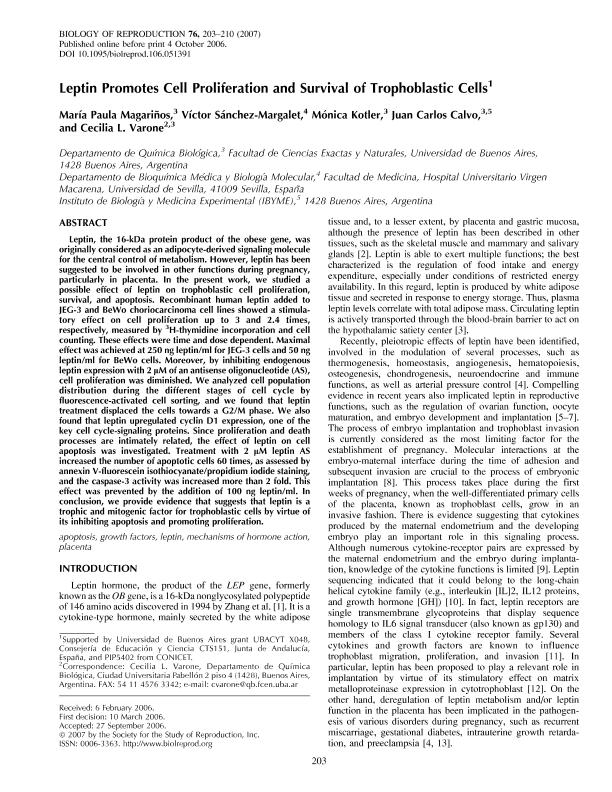Mostrar el registro sencillo del ítem
dc.contributor.author
Magariños, María Paula

dc.contributor.author
Sánchez Margalet, Víctor
dc.contributor.author
Kotler, Monica Lidia

dc.contributor.author
Calvo, Juan Carlos

dc.contributor.author
Varone, Cecilia Laura

dc.date.available
2017-11-02T23:50:23Z
dc.date.issued
2007-02
dc.identifier.citation
Magariños, María Paula; Sánchez Margalet, Víctor; Kotler, Monica Lidia; Calvo, Juan Carlos; Varone, Cecilia Laura; Leptin promotes cell proliferation and survival of trophoblastic cells; Society for the Study of Reproduction; Biology of Reproduction; 76; 2; 2-2007; 203-210
dc.identifier.issn
0006-3363
dc.identifier.uri
http://hdl.handle.net/11336/27513
dc.description.abstract
Leptin, the 16-kDa protein product of the obese gene, was originally considered as an adipocyte-derived signaling molecule for the central control of metabolism. However, leptin has been suggested to be involved in other functions during pregnancy, particularly in placenta. In the present work, we studied a possible effect of leptin on trophoblastic cell proliferation, survival, and apoptosis. Recombinant human leptin added to JEG-3 and BeWo choriocarcinoma cell lines showed a stimulatory effect on cell proliferation up to 3 and 2.4 times, respectively, measured by 3H-thymidine incorporation and cell counting. These effects were time and dose dependent. Maximal effect was achieved at 250 ng leptin/ml for JEG-3 cells and 50 ng leptin/ml for BeWo cells. Moreover, by inhibiting endogenous leptin expression with 2 μM of an antisense oligonucleotide (AS), cell proliferation was diminished. We analyzed cell population distribution during the different stages of cell cycle by fluorescence-activated cell sorting, and we found that leptin treatment displaced the cells towards a G2/M phase. We also found that leptin upregulated cyclin D1 expression, one of the key cell cycle-signaling proteins. Since proliferation and death processes are intimately related, the effect of leptin on cell apoptosis was investigated. Treatment with 2 μM leptin AS increased the number of apoptotic cells 60 times, as assessed by annexin V-fluorescein isothiocyanate/propidium iodide staining, and the caspase-3 activity was increased more than 2 fold. This effect was prevented by the addition of 100 ng leptin/ml. In conclusion, we provide evidence that suggests that leptin is a trophic and mitogenic factor for trophoblastic cells by virtue of its inhibiting apoptosis and promoting proliferation.
dc.format
application/pdf
dc.language.iso
eng
dc.publisher
Society for the Study of Reproduction

dc.rights
info:eu-repo/semantics/openAccess
dc.rights.uri
https://creativecommons.org/licenses/by-nc-sa/2.5/ar/
dc.subject
Apoptosis
dc.subject
Growth Factors
dc.subject
Leptin
dc.subject
Mechanisms of Hormene Action
dc.subject.classification
Bioquímica y Biología Molecular

dc.subject.classification
Ciencias Biológicas

dc.subject.classification
CIENCIAS NATURALES Y EXACTAS

dc.title
Leptin promotes cell proliferation and survival of trophoblastic cells
dc.type
info:eu-repo/semantics/article
dc.type
info:ar-repo/semantics/artículo
dc.type
info:eu-repo/semantics/publishedVersion
dc.date.updated
2017-10-12T19:48:59Z
dc.identifier.eissn
1529-7268
dc.journal.volume
76
dc.journal.number
2
dc.journal.pagination
203-210
dc.journal.pais
Estados Unidos

dc.journal.ciudad
Nueva York
dc.description.fil
Fil: Magariños, María Paula. Universidad de Buenos Aires. Facultad de Ciencias Exactas y Naturales. Departamento de Química Biológica; Argentina
dc.description.fil
Fil: Sánchez Margalet, Víctor. Universidad de Buenos Aires. Facultad de Medicina; Argentina. Universidad de Sevilla; España
dc.description.fil
Fil: Kotler, Monica Lidia. Universidad de Buenos Aires. Facultad de Ciencias Exactas y Naturales. Departamento de Química Biológica; Argentina
dc.description.fil
Fil: Calvo, Juan Carlos. Consejo Nacional de Investigaciones Científicas y Técnicas. Instituto de Biología y Medicina Experimental. Fundación de Instituto de Biología y Medicina Experimental. Instituto de Biología y Medicina Experimental; Argentina. Universidad de Buenos Aires. Facultad de Ciencias Exactas y Naturales. Departamento de Química Biológica; Argentina
dc.description.fil
Fil: Varone, Cecilia Laura. Universidad de Buenos Aires. Facultad de Ciencias Exactas y Naturales. Departamento de Química Biológica; Argentina
dc.journal.title
Biology of Reproduction

dc.relation.alternativeid
info:eu-repo/semantics/altIdentifier/url/https://academic.oup.com/biolreprod/article-lookup/doi/10.1095/biolreprod.106.051391
dc.relation.alternativeid
info:eu-repo/semantics/altIdentifier/doi/http://dx.doi.org/0.1095/biolreprod.106.051391
dc.relation.alternativeid
info:eu-repo/semantics/altIdentifier/pmid/17021346
Archivos asociados
